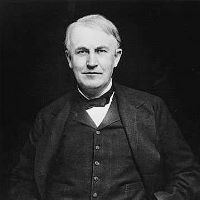Forgive Like Edison, or Better Yet, Jesus

When Edison and his staff were developing the incandescent light bulb, it took twenty-four hours to manufacture a single bulb. One day he handed a new bulb to a young errand boy and asked him to take it upstairs to the testing room.
As the boy turned and started up the stairs, he stumbled and fell, and the bulb shattered on the steps. Instead of rebuking the boy, Edison reassured him and then turned to his staff and told them to start working on another bulb.
When it was completed a day later, Edison demonstrated the reality of his forgiveness in the most powerful way possible. He walked over to the same boy, handed him the bulb, and said, “Take this up to the testing room.â€
Imagine how that boy must have felt.
He knew that he didn’t deserve to be trusted with this responsibility again. Yet, here it was, being offered to him as though nothing had ever happened. Nothing could have restored this boy to the team more quickly, more convincingly, or more fully.
Are You Being Outwitted by Satan?
How much more should those of us who have experienced reconciliation through Christ be quick to use visible, personal actions to demonstrate forgiveness and restoration!
This is what the Apostle Paul taught the Corinthians after they had disciplined a member of their church. When Paul learned of this man’s prolonged censure, he exhorted the elders to immediately and publicly forgive and restore him:
This punishment by the majority is enough, so you should rather turn to forgive and comfort him, or he may be overwhelmed by excessive sorrow. So I beg you to reaffirm your love for him … so that we would not be outwitted by Satan; for we are not ignorant of his designs (2 Cor. 2:6-11).
The word translated as “reaffirm†in this passage means “to make valid, ratify, or impart authority or influence.†Thus Paul was instructing the elders of the Corinthian church to formally declare with explicit words and visible actions that this repentant brother’s sins were forgiven and that he was to be fully restored to body life.
Paul adds a sense of urgency to this teaching by reminding the Corinthians that Satan is always looking for ways to outwit the church by playing on strained relationships.
Sadly, both then and today, individual Christians and entire churches often play right into our enemy’s hands. Wanting to look spiritual, we say we forgive others, but all too often we don’t follow up with actions that demonstrate a desire for a genuinely restored relationship.
Instead, we hold others at a distance, either out of insensitivity or to continue their punishment or to force them to prove their repentance or earn our forgiveness. Before long, many of them give up hope of genuine reconciliation and drift away, giving Satan the satisfaction of another fractured Christian relationship that discredits the gospel (John 13:34-35).
Forgive Like Jesus
Edison’s example of forgiveness is admirable, but Jesus far outshines him, not only in the transcendent, eternal price and impact of the gospel but also in very practical, personal ways.
In perhaps the best known parable Jesus taught, the prodigal son’s father runs eagerly toward his boy at the first sign of repentance, throws his arms around him, and lavishes him with every visible sign he can think of—hugs, kisses, robe, ring, fattened calf, community banquet—to publicly prove and proclaim their fully restored relationship (Luke 15:20-24).
In a far more astonishing and personal example, Jesus publicly restored Peter (who had denied Jesus three times at his most desperate hour) by reaffirming his apostolic position and special calling to lead the building of the church (John 21:15-17).
These examples, parables, and commands give us a clear path to follow.
So the next time you have the opportunity to forgive someone who has repented of a wrong, look him in the eye and with genuine warmth and love speak these hope-giving words, “I forgive you.â€
And then back up your words with actions.
Whether you embrace or shake a hand, offer a material gift (robe or ring), host a family meal or public celebration (fattened calf), or publicly reaffirm someone’s gifting and calling (light bulb or ministry), make every effort to restore the relationship in a way that fulfills God’s command to “forgive each other just as in Christ God forgave you” (Eph. 4:32).
– Ken Sande
Reflection Questions
- Have you ever been estranged from a person or group that refused to be genuinely reconciled with you? How did it feel? How did you respond?
- Why is it that Christians often fail to carry out this crucial restoring process?
- Why are many non-Christians more forgiving than those who claim to trust in Jesus? (see Common Grace: Exploring Relationships with Non-Christians)
- How does a right understanding of the gospel provide the motivation, pattern, and power to genuinely restore broken relationships?
- How can making and keeping the “Four Promises of Forgiveness†help to restore a relationship?
- Is there a repentant person you’ve been holding at a distance, either deliberately or simply because you were insensitive to their desire for reconciliation? Go to that person today and imitate the restoring love of Christ with concrete and visible actions.
- See this excerpt from The Peacemaker for guidance on the related concepts of confession, repentance, discipline and accountability, restitution, and protecting others from unrepentant people.
Permission to distribute: Please feel free to download, print, or electronically share this message in its entirety for non-commercial purposes with as many people as you like.
© 2015 Ken Sande
Would you like to receive future posts like this? Subscribe now!








Yes, I have been estranged. It feels awful. I have reached out numerous time, but there is no reciprocation, even outright exclusion. I just stopped trying.
Started resorting to praying for that person instead of reaching out. Actually, this has been a pattern for my entire life from childhood. Sometimes I knew what I had done, other times, I had not clue what happened. I believe God has placed me in this position to make me stronger–and what people say and how they treat me, matters to me less. Once I apologize, even numerous times…if it’s not accepted, I have to move on. Wish it were different, but it’s not.
I’m sorry to hear that you’ve experienced this kind of cold treatment from others, Stephanie. I have too and it’s heartbreaking. If people will not discuss what happened, much less be open to reconciliation, we do have to let go of that relationship, ask God to help us see any area where he wants us to grow, and focus on our assurance that we are dearly loved, completely forgiven, and forever accepted by Jesus.
Relationships are so complicated. Is there a time when it is healthy and needful for you to create distance between yourself and another person? I have found the effects of some people’s attitudes toward me to be toxic and harmful to my spiritual walk. In one working relationship, I objected to their treatment of me and wanted to talk about why it was hurting me but anytime I talked about their behavior, they shut down. I could no longer work with them because of it. In another case, there was so much negativity and sometimes hostility would come to the surface. Many accusations about my character, most of which were untrue. I think there was some jealously involved. I tried to be patient and I didn’t answer back in kind but I found that my interactions with them and attempts to answer them were draining me and keeping me from having time to forge ahead in other areas of my life that I believe God wanted me to go. I had to create distance in that relationship, too. In both cases, it was long term patterns of behavior and no evidence of repentance or a change of heart. I continue to wrestle with how to forgive and how to respond in situations like these.
You’re absolutely right, relationships and forgiveness can be very complicated. Although we should not give up quickly or easily on reconciliation, the Bible does teach that there are times when we must distance ourselves from an unrepentant person (e.g., Titus 3:10). I encourage you to get a copy of The Peacemaker for guidance on how to related to unrepentant people.
Actually, I have referred to your book numerous times when I was in a particularly difficult relational situation. It was very helpful. The key, for me, was to be confident about who I am in Christ and find my safety and security in Him. I think you and step885 have both made reference to this in your posts. Being rooted in Christ’s love (Eph. 3:17) was what has enabled me to hold my relationships loosely, let go when it was needed (even when it is family!), and be patient with unjust behavior and accusations. And, like step885, I also believe that God will continue to bring these situations into my life because he wants me to grow. When I compare my recent responses with responses of 10 years ago, I can see a huge difference. Praise the Lord for the growth that He has brought about in me, which wouldn’t have come about without conflict.
Amen! Relationships are one of God’s main avenues for helping us to draw closer to him and to grow more to be like Christ!